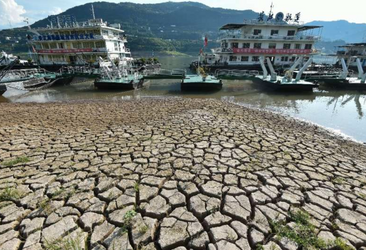70+ Days of Extreme Heat & Drought in China Devastate Residents, Infrastructure, Agriculture, and Tea
Posted by Paloma Pechenik on Sep 11th 2022
70+ Days of Extreme Heat & Drought in China Devastate Residents, Infrastructure, Agriculture, and Tea
China produces roughly half of all tea consumed worldwide. Whether your mug contains loose-leaf Ti Quan Yin or a store-brand teabag, Chinese artisans likely grow your tea. This year, sweltering temperatures devastated China for over two months. Weather stations documented days over 110°F.
"This combines the most extreme intensity with the most extreme length with an incredibly huge area all at the same time. There is nothing in world climatic history which is even minimally comparable to what is happening in China"
- Maximiliano Herrera, weather historian.
The Human Impact
Chinese citizens suffered from heat stroke, and the soles of their shoes melted on scorching hot pavement. In more than 80 cities, residents sought refuge in fountains, subway stations, caves, and even air raid bunkers.
It was lights out in metropolitan cities. The power grid was compromised by a reduction in hydroelectric input and overtaxed by demand for air conditioning. Outdoor and subway lighting, advertisements, and buildings dimmed nonessential power while factories halted operations.
"I feel too hot to sleep every night, and I'm awakened by the heat every morning," Xu Jinxin, a 20-year-old student, told AFP. "Because of the electricity shortage, we don't leave the air conditioner on all day but rather turn it off once it's cooled down a bit."
Water Power
Drought accompanied these extreme temperatures, drying up major rivers and waterways. Poyang Lake, the Yangtze River, and other vital water sources are at all-time lows.
Reservoirs and rivers generate hydroelectric power and irrigate crops. More than 80% of the energy in Sichuan province is hydroelectric - and blackouts forced manufacturing plants of batteries and solar panels to shut down.
Tea Production
Crops depend on consistent water and an appropriate climate. The heat wave scorched tea leaves, causing plants to shed. In some areas, younger tea tree roots were desiccated, and the plants didn't survive. There was little that growers and farm workers could do to salvage their crops. Conditions were so dangerous outside that they were unable to tend to the fields.
The heat significantly stunted summer yields, and the plants are unlikely to make a full recovery before harvest in the fall. Tea exporter Robert Xiong stated that, “they say this may be the coolest summer for the future 40 years.”
The Future of Tea
The catastrophic impact of this heatwave will have a global aftershock. This was not an isolated weather event. As Robert Xiong reminded us, this is just a glimpse of things to come. As extreme weather events become less predictable, agriculture, industry, and infrastructure will have to adapt to the waves.
SOURCES:
- China Heatwave Deadly to Tea and Man
- Chinese city dims lights in heatwave power crunch
- These 4 Main Tea Growing Regions In China Are Ideal For Producing Chinese Tea
- Exports of goods and services (% of GDP) - China
- Heatwave in China is the most severe ever recorded in the world
- Extreme China heatwave could lead to global chaos and food shortages
- Explainer: The power crunch in China's Sichuan and why it matters
- Shocking images reveal the devastation left by China’s record breaking drought
- Drought Causes Yangtze – China’s Most Important River – To Dry Up
- China logs hottest August since records began
- China Sees Record Summer Temperatures as Heat Set to Persist
- China says 267 weather stations broke temperature record in August

